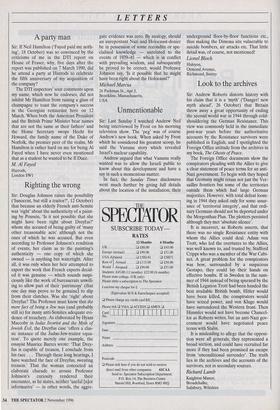Righting the wrong
Sir: Douglas Johnson raises the possibility (Innocent, but still a traitor?', 12 October) that because an elderly French anti-Semite was 'right' about the authenticity of a paint- ing by Poussin, 'Is it not possible that she might have been right about Dreyfus?' whom she accused of being guilty of 'many other treasonable acts' although not the ones of which he was accused. But even according to Professor Johnson's rendition of events, her claim as to the painting's authenticity — one copy of which she owned — is anything but watertight. After all, it was only when her heir attempted to export the work that French experts decid- ed it was genuine — which sounds suspi- ciously like the work of bureaucrats unwill- ing to allow part of their 'patrimony' (that one day may prove to be genuine) to slip from their clutches. Was she 'right' about Dreyfus? The Professor must know that the mere fact of being a Jew was (and probably still is) for many anti-Semites adequate evi- dence of treachery. As elaborated by Hyam Maccoby in Judas Iscariot and the Myth of Jewish Evil, the Dreyfus case 'offers a clas- sic instance of the Judas-Jew-traitor equa- tion'. To quote merely one example, the essayist Maurice Barres wrote: 'That Drey- fus is capable of treason, I conclude from his race . . . Through these long hearings, I have watched the face of Dreyfus, sweating treason.' That the woman concocted an elaborate charade to arouse Professor Johnson's curiosity rendered their encounter, as he states, neither 'useful [n]or informative' — in other words, the aggre- gate evidence was zero. By analogy, should an unrepentant Nazi and Holocaust-denier be in possession of some recondite or spe- cialised knowledge — unrelated to the events of 1939-45 — which is in conflict with prevailing wisdom, and subsequently be proved to be correct, would Professor Johnson say, Is it possible that he might have been right about the Holocaust?'
Michael Marcus
26 Parkman St., Apt 3, Brookline, Massachusetts, USA


















































































 Previous page
Previous page